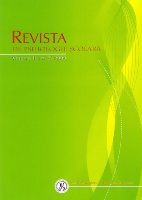Relaţia dintre nivelul dezvoltării limbajului, memoria de lucru, vocabular şi variabilele socio-demografice la copiii cu vârste între 4 şi 6 ani
Relationship Between Language Development, Working Memory, Vocabulary and Socio-Economic Status in Children Aged Between 4 and 6 Years Old
Author(s): Róbert Balázsi, Florian Kirshner, Silvia Călbează, Anca DobreanSubject(s): Psychology
Published by: Editura Universitatii din Oradea
Keywords: oral language; working memory; vocabulary
Summary/Abstract: Oral language represents the most important instrument of communication of thoughts thus language is vital for the adaptation to the norms of any society. The main objective of this research is to determine the importance of different factors, environmental and individual in the determination of age differences (4 to 6 years) in the expressive language ability. The instruments used in this study are: Preschool Language Assessment Instrument, PLAI, 2nd edition, a test for determining work memory (adapted after Hughes, 1998), a vocabulary scale (Raven, 1988) and a demographic questionnaire that contains references to the educational level of the parents, number of siblings and the birth order of the evaluated child and respectively the whole income of the family. Results obtained on 80 participants show that individual variables (vocabulary and work memory) explain 53% of oral language variance and from the socio-demographic variables only the educational level of the mother is significant, this explaining 5,4%. An important factor is the fact that in either of the tested ierarhic regression models the individual variables and the socio-demographic ones did not reduce to insignificant the contribution of age which suggests the necessity to respect the initial model, thus increasing its predictive value.
Journal: Revista de Psihologie Şcolară
- Issue Year: 2009
- Issue No: II - 3
- Page Range: 12-27
- Page Count: 16
- Language: Romanian

